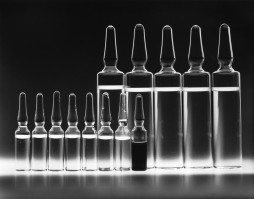
New data have shown that first-line treatment with a combination of two immunotherapy drugs improves overall survival in a subset of patients with advanced non-small cell lung cancer (NSCLC) compared to chemotherapy.
The data from the CheckMate-227 trial, reported at the ESMO Congress 2019, suggest that the combination of nivolumab plus low-dose ipilimumab could offer a chemotherapy-free option for first-line treatment of patients with advanced NSCLC.
Nivolumab, a PD-1 antibody, and ipilimumab, an anti-cytotoxic T-lymphocyte antigen 4 (CTLA-4) antibody, are immune checkpoint inhibitors with distinct but complementary mechanisms of action.
The global phase 3 CheckMate-227 study included patients with stage IV or recurrent NSCLC who had received no previous treatment.
Part 1 of this multipart study was designed to evaluate different nivolumab-based regimens versus chemotherapy in two different PD-L1 subgroups.
In part 1 of the trial, patients with PD-L1 expression of at least 1% (n=1,189 patients) were randomized to three treatment options: nivolumab plus low-dose ipilimumab, nivolumab or histology-based chemotherapy.
Patients with PD- L1<1% (n=550) were randomised to nivolumab plus low-dose ipilimumab, nivolumab plus chemotherapy or chemotherapy.
Overall survival was significantly longer with nivolumab plus ipilimumab compared to chemotherapy.
Patients with PD- L1>1% treated with nivolumab plus ipilimumab had a median overall survival of 17.1 months (95% confidence interval [CI] 15.0-20.1 months) compared to 14.9 months (95% CI 12.7-16.7 months) in the chemotherapy group (hazard ratio [HR] 0.79, 97.72% CI 0.65-0.96, p=0.007).
Progression-free survival, objective response rates and duration of response were all greater with nivolumab plus ipilimumab compared to chemotherapy.
Overall survival also showed benefit with nivolumab plus ipilimumab vs chemotherapy in patients with PD-L1<1% and in all randomised patients (those with PD-L1<1% and >1%).
The rate of grade 3-4 treatment-related adverse events across all patients was 33% in those treated with nivolumab plus low-dose ipilimumab, 19% with nivolumab and 36% with chemotherapy.
“In my opinion these data are practice changing. CheckMate-227 is the first trial showing that the combination of nivolumab and ipilimumab prolongs survival as compared to chemotherapy in treatment-naïve patients with metastatic NSCLC,” said study first author Prof. Solange Peters, Centre Hospitalier Universitaire Vaudois, Lausanne, Switzerland. “We already have several front-line treatment options for these patients, including chemotherapy combined with an anti- PD1 agent or an anti-PDL1 agent alone. And now we have a chemotherapy-sparing option of nivolumab plus ipilimumab.”
Peters added, “The important step now is to develop an algorithm to select the best front-line treatment for each patient. We need to wait for a little more time to see which treatment really gives rise to improved long-term survival. The five- year survival from trials with these treatments will teach us if any of the options are better than others. The second critical point will be to compare toxicities. We can then have an informed discussion with our patients.”
She noted that CheckMate-227 showed that safety profiles of both strategies are different, in terms of specific toxicity events encountered, their timing, grade and prevalence, with diarrhoea, rash and fatigue being the most common adverse events with nivolumab/ipilimumab and fatigue, gastrointestinal and haematological toxicities with chemotherapy.
“We used a low dose of ipilimumab (1mg every 6 weeks) to make it tolerable. Doing this led to a low rate of discontinuation and treatment-related toxicities or deaths. So it’s a highly manageable treatment.”
Considering the limitations of the trial, Peters explained that it started before chemotherapy/immunotherapy or immunotherapy alone was approved for the front-line treatment of NSCLC, so the two-drug immunotherapy combination was not compared with current standards of care.
“Unfortunately, we did not include a treatment arm with the combination of chemotherapy plus nivolumab in the PD-L1 positive cohort, but only in the negative one,” she said.
However, an exploratory analysis suggested that nivolumab/ipilimumab was more effective than nivolumab alone in the
PD-L1 positive group, which was more effective than chemotherapy.
Additionally nivolumab/ipilimumab demonstrated a higher activity than nivolumab combined with chemotherapy in PD-L1 negative patients.
Another limitation was that the trial was designed to formally assess overall survival in patients who were positive for PD- L1.
“But we looked in an exploratory fashion at the subgroup of patients who were negative for PD-L1. Similarly to patients who were positive for PD-L1 the benefit with nivolumab/ipilimumab was seen across variable levels of PD-L1 expression, including negative ones,” said Peters.
Commenting on the relevance of the new data, Dr Marina Chiara Garassino, Istituto Nazionale dei Tumori, Milan, Italy, said, “These data show we have a new treatment option for the first-line treatment of metastatic NSCLC, to add to the current treatment options of chemotherapy plus immunotherapy regardless of PD-L1 level or immunotherapy as single agent for patients with PD-L1 scores of at least 50%.”
But she cautioned, “We don’t yet know if the findings are practice changing. We need to understand which treatment is best for each patient: chemotherapy plus immunotherapy, immunotherapy alone or immunotherapy plus immunotherapy.”
She considered more information is needed on biomarkers to individualise therapy.
Garassino agreed on the limitation of CheckMate-227 to have started before the introduction of current standards of care.
“The comparison was chemotherapy alone, but this is no longer the standard for patients with metastatic NSCLC,” she said.
Source: ESMO
Watch the press conference here.
Watch our interview Dr Marina Chiara Garassino commenting on the study here.
The World Cancer Declaration recognises that to make major reductions in premature deaths, innovative education and training opportunities for healthcare workers in all disciplines of cancer control need to improve significantly.
ecancer plays a critical part in improving access to education for medical professionals.
Every day we help doctors, nurses, patients and their advocates to further their knowledge and improve the quality of care. Please make a donation to support our ongoing work.
Thank you for your support.